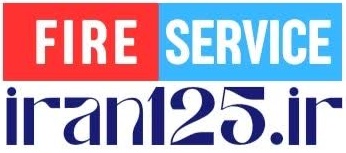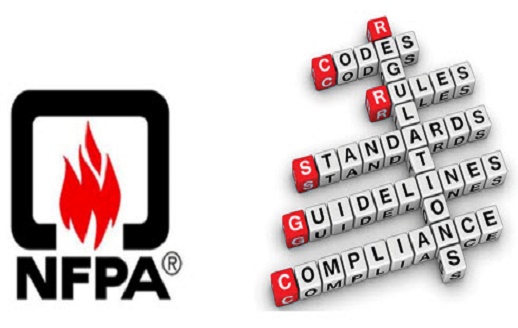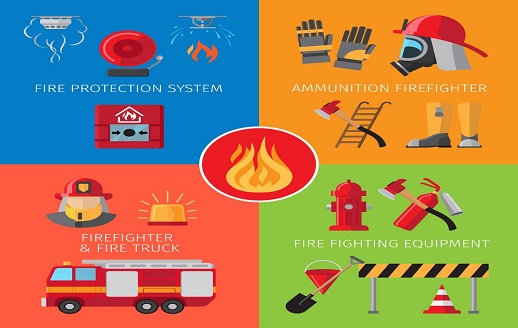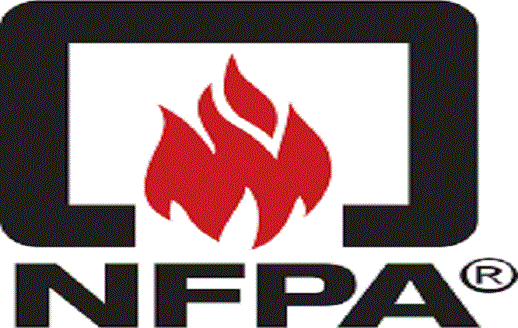-
-
۱۸۷۹
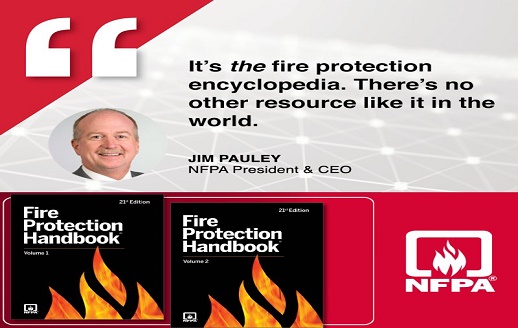
یک کتابچه جدید برای محافظت در برابر آتش اکنون برای پیش سفارش در دسترس است! کتاب بی نظیر که یکی از مهم ترین انتشارات NFPA است که یک مرور کلی از صدها مفهوم حفاظت در برابر آتش را برای متخصصان در طیف گسترده ای از صنایع ارائه می دهد.
این کتاب راهنما در حال حاضر 1401/11/02 به صورت پیش فروش در سایت NFPA می باشد . زمانی که کتاب به صورت رسمی به فروش برسد ، سعی خواهیم نمود بخش های مهمی از آن را برای کارشناسان فعال در زمینه حفاظت در برابر آتش در سایت جامع آتش نشانی NFSI انتشار بدهیم.
Section 1 Safety in the Built Environment
Chapter 1-1 The NFPA Fire & Life Safety Ecosystem
Chapter 1-2 Challenges to Safety in the Built Environment
Chapter 1-3 Codes and Standards for the Built Environment
Chapter 1-4 Legal Issues for Design and Enforcement Professionals
Chapter 1-5 Fire Prevention and Code Enforcement
Chapter 1-6 Systems Approach to Fire-Safe Building Design
Chapter 1-7 Wildland Fires and Wildland/Urban Interface
Chapter 1-8 The Interconnected All-Hazards Fire Department
Chapter 1-9 Smart Infrastructure and Fire Protection
Section 2 Basics of Fire and Fire Science
Chapter 2-1 Physics and Chemistry of Fire
Chapter 2-2 Physics of Fire Configuration
Chapter 2-3 Fire Hazards of Materials and Products
Chapter 2-4 Introduction to Compartment Fires
Chapter 2-5 Basics of Fire Containment
Chapter 2-6 Fundamentals of Fire Detection
Chapter 2-7 Theory of Fire Extinguishment
Chapter 2-8 Explosions
Section 3 Information and Analysis for Fire Protection
Chapter 3-1 An Overview of the Fire Problem
Chapter 3-2 Fire Loss Investigation
Chapter 3-3 Fire Incident Data: From Collection to Use
Chapter 3-4 Introduction to Fire Modeling
Chapter 3-5 Fire Hazard Analysis Techniques
Chapter 3-6 Fire Risk Analysis
Chapter 3-7 Closed Form Enclosure Fire Calculations
Chapter 3-8 The Role of Performance-Based Codes and Standards in Fire Safety Design
Chapter 3-9 Overview of Performance-Based Fire Protection Design
Section 4 Human Factors in Emergencies
Chapter 4-1 Human Behavior in Fire
Chapter 4-2 Calculation Methods for Egress Prediction
Chapter 4-3 Facilitating Occupant Movement During Emergencies
Chapter 4-4 Techniques of Crowd Management
Section 5 Fire and Life Safety Education
Chapter 5-1 Community Risk Reduction
Chapter 5-2 Principles and Techniques of Fire and Life Safety Education
Chapter 5-3 Fire and Life Safety Education Messages
Chapter 5-4 Evaluation Techniques for Fire and Life Safety Education
Chapter 5-5 Educators as Public Information Officers and Effective Media Relations
Chapter 5-6 Reaching High-Risk Groups
Chapter 5-7 Youth Firesetting
Section 6 Characteristics of Materials and Products
Chapter 6-1 Fire Hazards of Materials
Chapter 6-2 Combustion Products and Their Effects on Life Safety
Chapter 6-3 Concepts and Protocols of Fire Testing
Chapter 6-4 Wood and Wood-Based Products
Chapter 6-5 Fibers and Textiles
Chapter 6-6 Upholstered Furniture and Mattresses
Chapter 6-7 Fire-Retardant and Flame-Resistant Treatment of Cellulosic Materials
Chapter 6-8 Additive Flame Retardants
Chapter 6-9 Dusts
Chapter 6-10 Metals
Chapter 6-11 Gases
Chapter 6-12 Medical Gases
Chapter 6-13 Ignitible (Flammable and Combustible) Liquids
Chapter 6-14 Polymeric Materials
Chapter 6-15 Pesticides
Chapter 6-16 Explosives and Blasting Agents
Chapter 6-17 Manufacture and Storage of Aerosol Products
Chapter 6-18 Solid and Liquid Oxidizers
Chapter 6-19 Organic Peroxides
Chapter 6-20 Tables and Charts
Chapter Section 7 Storage and Handling of Materials
Chapter 7-1 Storage and Handling of Solid Fuels
Chapter 7-2 Storage of Ignitible (Flammable and Combustible) Liquids
Chapter 7-3 Storage of Gases
Chapter 7-4 Storage and Handling of Chemicals
Chapter 7-5 Hazardous Waste Control
Section 8 Special Equipment
Chapter 8-1 Air-Moving Equipment
Chapter 8-2 Chemical Processing Equipment
Chapter 8-3 Material Handling Equipment
Chapter 8-4 Automated Equipment
Chapter 8-5 Lasers
Chapter 8-6 Protection of Electronic Equipment
Chapter 8-7 Heat Transfer Systems and Fluids
Chapter 8-8 Industrial and Commercial Heat Utilization Equipment
Chapter 8-9 Oil Quenching and Molten Salt Baths
Chapter 8-10 Stationary Combustion Engines and Fuel Cells
Chapter 8-11 Fluid Power Systems
Chapter 8-12 Industrial Refrigeration Systems
Chapter 8-13 Photovoltaic Systems
Chapter 8-14 Energy Storage Systems
Section 9 Processes and Facilities
Chapter 9-1 Woodworking Facilities and Processes
Chapter 9-2 Spray Finishing and Powder Coating
Chapter 9-3 Dipping and Coating Processes
Chapter 9-4 Plastics Industry and Related Process Hazards
Chapter 9-5 Metalworking Processes
Chapter 9-6 Cannabis Processing Facilities
Chapter 9-7 Storage and Bulk Handling of Grain Elevator and Milling Operations
Chapter 9-8 Protection of Records
Chapter 9-9 Semiconductor Manufacturing
Chapter 9-10 Oilseed Solvent Extraction Plants
Chapter 9-11 Protection of Wastewater Treatment Plants
Chapter 9-12 Fire Protection of Laboratories Using Chemicals
Chapter 9-13 Fire Protection of Telecommunications Facilities
Chapter 9-14 Electric Generating Plants
Chapter 9-15 Nuclear Facilities
Chapter 9-16 Mining and Mineral Processing
Chapter 9-17 Oxygen-Enriched Atmospheres
Section 10 Building Services
Chapter 10-1 Emergency and Standby Power Supplies
Chapter 10-2 Electrical Systems and Appliances
Chapter 10-3 Heating Systems, Boiler Furnaces, and Appliances
Chapter 10-4 Building Transportation Systems
Chapter 10-5 Air-Conditioning and Ventilating Systems
Chapter 10-6 Ventilation of Commercial Cooking Operations
Section 11 Fire Prevention Practices
Chapter 11-1 Waste Handling and Control
Chapter 11-2 Housekeeping Practices
Chapter 11-3 Site Design for Fire Safety
Chapter 11-4 Fire Hazards of Construction, Alteration, and Demolition of Buildings
Chapter 11-5 Welding, Cutting, and Other Hot Work
Chapter 11-6 Control of Electrostatic Ignition Sources
Chapter 11-7 Lightning Protection Systems
Section 12 Non-Emergency Fire Department Functions
Chapter 12-1 Planning for Public Fire-Rescue Protection
Chapter 12-2 Organizational Benchmarking and Performance Evaluation
Chapter 12-3 Needs Assessment and Hazard Analysis
Chapter 12-4 Managing Fire-Rescue Departments
Chapter 12-5 Information Management, Computer Technology, and GIS for Fire Station Locations and Response Protocols
Chapter 12-6 Liability of Fire Service Organizations for Negligent Firefighting
Chapter 12-7 Understanding and Addressing Discrimination and Harassment in the Fire Service
Chapter 12-8 Safety, Medical, and Health Issues and Programs
Chapter 12-9 Fire and Emergency Services Protective Clothing and Protective Equipment
Chapter 12-10 Effect of Building Construction and Fire Protection Systems on Firefighter Safety
Chapter 12-11 Training Programs for Fire and Emergency Service Personnel
Chapter 12-12 Fire Rescue Stations and Fire Service Training Centers
Chapter 12-13 Disaster Planning and Response Services
Chapter 12-14 Public Emergency Services Alarm, Dispatch, and Communications Systems
Chapter 12-15 Pre-Incident Planning for Industrial and Municipal Emergency Response
Section 13 Fire Department Emergency Operations
Chapter 13-1 Fireground Operations
Chapter 13-2 Organizing Search and Rescue Operations
Chapter 13-3 Emergency Medical Services and the Fire Department
Chapter 13-4 Emergency Vehicles and Equipment
Chapter 13-5 Fire Streams
Chapter 13-6 Alternate Water Supplies
Chapter 13-7 Public Fire Protection and Hazardous Materials Management
Chapter 13-8 Managing the Response to Hazardous Materials Incidents
Chapter 13-9 Aircraft
Chapter 13-10 Wildland Fire Management
Chapter 13-11 Active Shooter/Hostile Event Operations
Chapter 13-12 Fireground Operations for Energy Storage Systems
Section 14 Detection and Alarm
Chapter 14-1 Fire Alarm and Signaling Systems
Chapter 14-2 Automatic Fire Detectors
Chapter 14-3 Notification Appliances
Chapter 14-4 Fire Alarm System Interconnections
Chapter 14-5 Inspection, Testing, and Maintenance of Fire Alarm and Signaling Systems
Chapter 14-6 Household Fire Warning Equipment
Chapter 14-7 Fire Protection Surveillance and Security Services
Chapter 14-8 Gas and Vapor Detection Systems and Monitors
Chapter 14-9 Carbon Monoxide Detection
Chapter 14-10 Fuel Gases Detection
Section 15 Water Supplies for Fixed Fire Protection
Chapter 15-1 Fixed Water Storage Supplies for Fire Protection
Chapter 15-2 Water Supply Requirements for Public Supply Systems
Chapter 15-3 Hydraulics for Fire Protection
Chapter 15-4 Water Supplies for Sprinkler Systems
Chapter 15-5 Corrosion in Fire Sprinkler Systems
Chapter 15-6 Fire Pumps
Chapter 15-7 Fire Pump Controllers and Power Supply Arrangements for Motor-Driven Fire Pumps
Section 16 Water-Based Fire Suppression Equipment
Chapter 16-1 Principles of Automatic Sprinkler System Performance
Chapter 16-2 Automatic Sprinklers
Chapter 16-3 Automatic Sprinkler Systems
Chapter 16-4 Supporting Water-Based Systems
Chapter 16-5 Sprinkler Systems for Storage Facilities
Chapter 16-6 Residential Sprinkler Systems
Chapter 16-7 Ultra-High-Speed Water Spray Systems
Chapter 16-8 Water Mist Fire Suppression Systems
Chapter 16-9 Water Spray Protection
Chapter 16-10 Standpipe and Hose Systems
Chapter 16-11 Care and Maintenance of Water-Based Extinguishing Systems
Section 17 Fire Suppression Systems and Portable Fire Extinguishers
Chapter 17-1 Carbon Dioxide and Application Systems
Chapter 17-2 Chemical Extinguishing Agents and Application Systems
Chapter 17-3 Characteristics and Hazards of Water and Water Additives for Fire Suppression
Chapter 17-4 Foam Extinguishing Agents and Systems
Chapter 17-5 Portable Fire Extinguisher Applications, Use, and Maintenance
Chapter 17-6 Clean Agents and Systems
Chapter 17-7 Application of Gaseous Agents to Special Hazards Fire Protection
Chapter 17-8 Explosion Prevention and Protection
Section 18 Confining Fires
Chapter 18-1 Confinement of Fire in Buildings
Chapter 18-2 Interior Finish
Chapter 18-3 Smoke Movement in Buildings
Chapter 18-4 Venting Practices
Chapter 18-5 Firestopping
Chapter 18-6 Deflagration Venting
Section 19 Structural Fire Protection
Chapter 19-1 Fundamentals of Structurally Safe Building Design
Chapter 19-2 Types of Building Construction
Chapter 19-3 Modular Construction
Chapter 19-4 Fire Resistance of Structural Members and Assemblies
Chapter 19-5 Structural Fire Safety in One- and Two-Family Dwellings
Chapter 19-6 Analyzing Structural Fire Damage
Chapter 19-7 Structural Fire Safety Calculation Methods
Section 20 Protecting Occupancies
Chapter 20-1 Assessing Life Safety in Buildings
Chapter 20-2 Board and Care Facilities
Chapter 20-3 Lodging Establishments and University Housing
Chapter 20-4 Apartment Buildings
Chapter 20-5 One- and Two-Family Dwellings
Chapter 20-6 Manufactured Housing
Chapter 20-7 High-Rise Buildings
Chapter 20-8 Assembly Occupancies
Chapter 20-9 Mercantile Occupancies
Chapter 20-10 Business Occupancies
Chapter 20-11 Educational Occupancies
Chapter 20-12 Day-Care Occupancies
Chapter 20-13 Detention and Correctional Occupancies
Chapter 20-14 Health Care Occupancies
Chapter 20-15 Storage Occupancies
Chapter 20-16 Museums, Libraries, and Places of Worship
Chapter 20-17 Industrial Occupancies
Chapter 20-18 Occupancies in Special Structures
Section 21 Transportation Fire Safety
Chapter 21-1 Passenger Vehicle Fires
Chapter 21-2 Fire Safety in Commercial Vehicles
Chapter 21-3 Automotive and Marine Service Station Operations
Chapter 21-4 Alternative Fueled Vehicles and Fueling
Chapter 21-5 Fuel Cell Vehicles
Chapter 21-6 Recreational Vehicles
Chapter 21-7 Fixed Guideway Transit and Light Rail Systems
Chapter 21-8 Rail Transportation Systems
Chapter 21-9 Marine Vessels
Chapter 21-10 Road Tunnels and Bridges
Index
